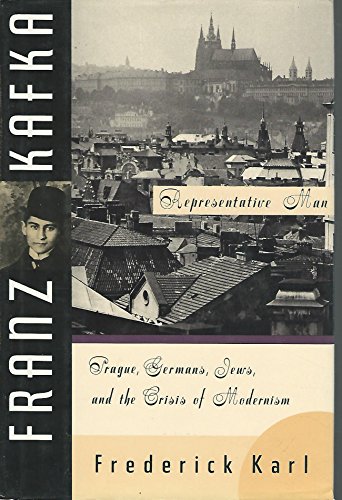Synopsis:
Depicts the life of the distinguished Austrian author, Franz Kafka, examines his personality, and traces the development of his literary career
Reviews:
In this discerning biography, New York University English professor Karl convincingly argues that Kafka's (1883-1924) life cannot be grasped by following a path of events, stressing that the writer who "communicated the century to us" was simply too reticent to be revealed by a series of incidents. So Karl approaches Kafka's development by other lights, not only those cast by his fictions, diaries and letters, but also by taking a fresh look at the social history of the late Austro-Hungarian empire and Prague, its "third city"--particularly the phenomenon of "secessionism," the flight of artists, cults and ethnic groups of the period from the mainstream. The book's lengthy text deepens the enigma of Kafka's art. Karl cannot uncover the ultimate sources that summoned this tentatively assimilated son of a Jewish merchant to his literary calling, but skillfully details the routes Kafka took to write. We're shown that anxiety and emotions so burdened Kafka that a diagnosis of terminal tuberculosis in 1917 provides genuine spiritual uplift. Though the sentence of death--still seven years from its term--informed his writing, it did not fundamentally change the direction of his work. This critical biography is a fair bid for the single most comprehensive examination of the author in English. Photos not seen by PW.
Copyright 1991 Reed Business Information, Inc.
Immense critical biography that makes Kafka the ``representative man'' of the 20th century and places him at the center of High Modernism in Prague. Karl (William Faulkner: American Writer, 1989, etc.; English & American Literature/NYU) draws on a relentless tide of fact and historical reasoning to separate out Kafka's many variations on himself: as obsessive writer, episodic depressive, diarist, insurance agent, letter writer, family member, disease victim, lifelong hypochondriac, frequenter of gentile Czech prostitutes, and man who belonged to a despised German-speaking minority within a Jewish minority and felt he had no native tongue with which to speak his deepest feelings. But each time Karl quotes Kafka, the writer springs alive on the page and struggles against the biography hardening around his ankles. Is this nervous, evasive phantom at last to be set before us plain, his every private thought caught naked? Working in Karl's favor, once one accepts his unsmiling seriousness, is Kafka himself, a spellbinding creature. Working against Karl is his tie to the reader, who hopes for the comfortable familiarity of Brian Boyd on Nabokov or the artistry and fervor of Richard Ellmann on Joyce--but must settle for a faceless and not very graceful biographer intent on his cultural perspectives and on proving something many readers may not care about anyway. All this said, this is a generally gripping and edifying book. Fresh material comes from works in German unavailable to English-language readers, from what Karl ``discovered in Prague about Kafka's cultural activities,'' and from a newly unearthed batch of 32 letters Kafka wrote to his parents near the end of his life. Karl is as rich with ideas and as fearless at entering Kafka's world as was Kafka himself. Despite its flaws, then, an important biography and likely to become a standard critical biography of K. (Thirty-two page b&w photo insert--not seen.) -- Copyright ©1991, Kirkus Associates, LP. All rights reserved.
This book claims to be the definitive biography of the troubled author of such Modernist works as The Trial and The Metamorphosis . Karl is the author of equally weighty biographies of Conrad ( Joseph Conrad: The Three Lives , LJ 12/1/78) and Faulkner ( William Faulkner: American Writer , LJ 2/1/89), as well as works of criticism of 20th-century literature. He has amassed a prodigious amount of information and produced a thorough analysis of Kafka's difficult relationships with his parents and his fiancee, Felice Bauer, his exceptional distaste for reminders of bodily functions, his love-hate relationship with Judaism, and his antipathy to being closed in, all of which fed his creative genius. Many scholars will be pleased by the excellent description of the Austro-Hungarian culture, but general readers will wish for more editing. For academic and large public libraries.
- Ann Sapp, Montgomery Cty. Dept. of Public Libs., Md.
Copyright 1991 Reed Business Information, Inc.
"About this title" may belong to another edition of this title.
![]()
